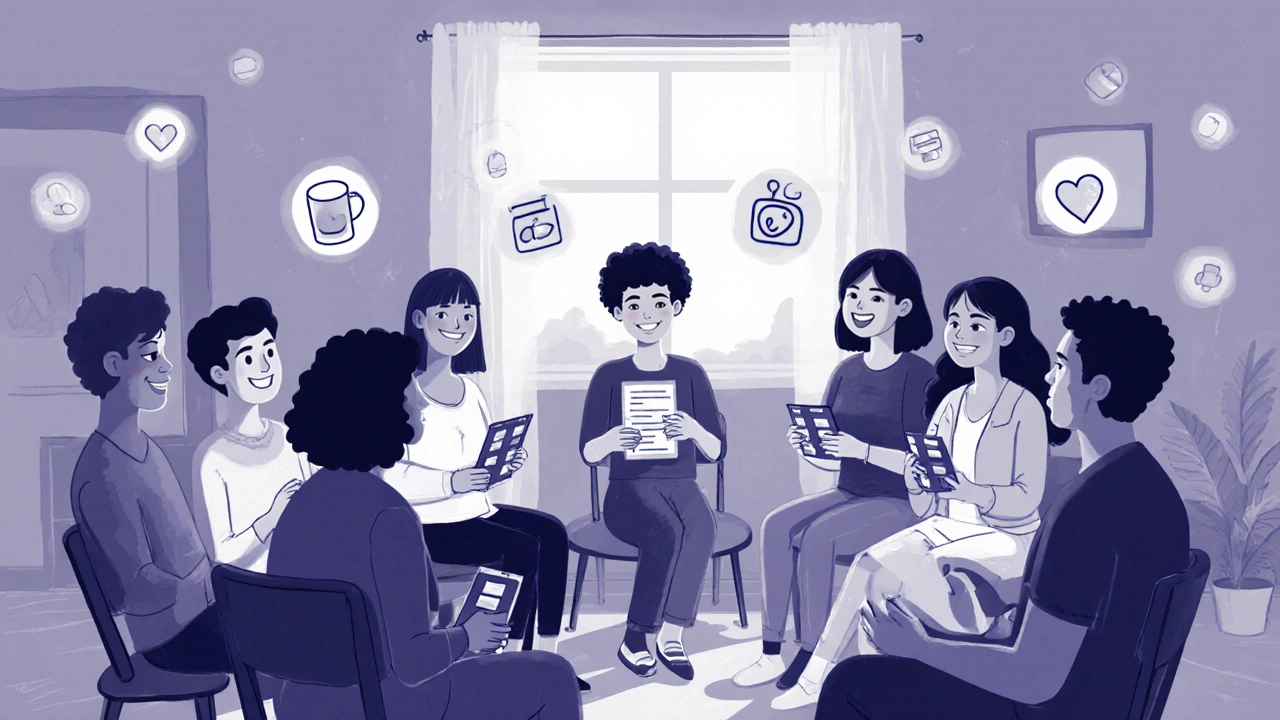Support groups and community programs dramatically improve medication compliance by offering peer support, practical tips, and emotional connection - not just information. Real data shows they cut hospital readmissions and save billions.
Support groups that actually help — how to find the right one
A single good tip from someone who's been there can cut months off your learning curve. Whether you're dealing with chronic illness, mental health, medication side effects, or recovery, a well-run support group gives practical help, not just sympathy. This page shows where to look, how to check if a group is trustworthy, and quick rules to get value without wasting time or risking your privacy.
Where to look and what to expect
Start local and online at the same time. Local hospitals, clinics, and community centers often list support groups for conditions like COPD, diabetes, or cancer. Online, search platforms like Facebook Groups, Reddit communities, and patient forums. Look for groups that have clear rules, active moderation, and recent posts — those signs mean people are engaged and the space is safe to ask questions.
Use specific search terms: "COPD support group [city]", "acne support group" or "breast cancer survivor forum." On DoctorSolve, related articles that may connect you to communities include titles like "Essential Travel Tips for Individuals with Obstructive Pulmonary Disease," "Accutane: The Truth About Acne’s Most Powerful Treatment," and "Buspar for Anxiety: Uses, Side Effects, and What to Expect." Those pieces can help you find topics to bring to a group or highlight questions to ask.
How to pick a good group — quick checklist
When you find a possible group, use this short checklist before joining or getting involved:
- Active moderation: moderators remove spam and handle conflicts.
- Clear rules: no medical advice as fact, sources requested, respect required.
- Member mix: a blend of patients and professionals is a plus, but honest patient stories matter most.
- Privacy controls: can you post anonymously or limit who sees personal details?
- Recent activity: a stale group with old posts won’t help.
If a group pressures you to buy treatments, promotes miracle cures, or asks for money without transparency, walk away. Good groups focus on coping strategies, emotional support, practical tips, and experience-based info — not sales pitches.
Use groups to ask practical questions: how people manage side effects, travel tips while on meds, or ways to talk to your doctor. Keep medical decisions tied to your clinician. Treat group input as lived experience, not prescriptions.
Finally, protect yourself. Use a throwaway email if you want extra privacy, avoid sharing full medical records or financial info, and report abusive behavior. If a discussion feels overwhelming, step back — support groups should help you, not increase stress.
Want curated reads before joining a group? Browse DoctorSolve articles on specific treatments and conditions to prepare better questions and spot bad information faster. And if you're unsure whether a tip is safe, bring it to your healthcare provider first.
Joining a support group offers numerous benefits to individuals living with psoriasis. It provides a sense of community, emotional support, and practical tips for managing symptoms. These groups often serve as a platform for sharing experiences and learning from others facing similar challenges. Moreover, support groups can empower individuals to advocate for themselves and improve their quality of life. By connecting with others, individuals can feel less isolated and more understood.


